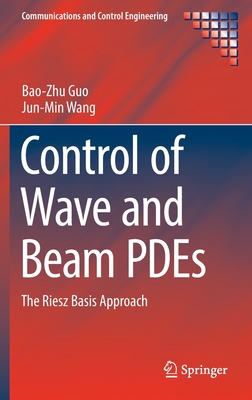Mathematical Control Theory: An Introduction
暫譯: 數學控制理論:入門指南
Zabczyk, Jerzy
- 出版商: Birkhauser Boston
- 出版日期: 2020-06-21
- 售價: $3,380
- 貴賓價: 9.5 折 $3,211
- 語言: 英文
- 頁數: 336
- 裝訂: Hardcover - also called cloth, retail trade, or trade
- ISBN: 3030447766
- ISBN-13: 9783030447762
-
相關分類:
控制系統 Control-systems
無法訂購
相關主題
商品描述
This textbook presents, in a mathematically precise manner, a unified introduction to deterministic control theory. With the exception of a few more advanced concepts required for the final part of the book, the presentation requires only a knowledge of basic facts from linear algebra, differential equations, and calculus.
In addition to classical concepts and ideas, the author covers the stabilization of nonlinear systems using topological methods, realization theory for nonlinear systems, impulsive control and positive systems, the control of rigid bodies, the stabilization of infinite dimensional systems, and the solution of minimum energy problems.
This second edition includes new chapters that introduce a variety of topics, such as controllability with vanishing energy, boundary control systems, and delayed systems. With additional proofs, theorems, results, and a substantially larger index, this new edition will be an invaluable resource for students and researchers of control theory.
Mathematical Control Theory: An Introduction will be ideal for a beginning graduate course in mathematical control theory, or for self-study by professionals needing a complete picture of the mathematical theory that underlies the applications of control theory.
From reviews of the first edition:
At last! We did need an introductory textbook on control which can be read, understood, and enjoyed by anyone. Gian-Carlo Rota, The Bulletin of Mathematics Books
It covers a remarkable number of topics...The exposition is excellent, and the book is a joy to read. A novel one-semester course covering both linear and nonlinear systems could be given...The book is an excellent one for introducing a mathematician to control theory. Bulletin of the AMS
Indeed, for mathematicians who look for the basic ideas or a general picture about the main branches of control theory, I believe this book can provide anexcellent bridge to this area. IEEE Control Systems Magazine
商品描述(中文翻譯)
這本教科書以數學精確的方式統一介紹了確定性控制理論。除了書籍最後部分所需的一些較高級概念外,這本書的內容僅需具備線性代數、微分方程和微積分的基本知識。
除了經典概念和思想外,作者還涵蓋了使用拓撲方法穩定非線性系統、非線性系統的實現理論、脈衝控制和正系統、剛體控制、無限維系統的穩定性以及最小能量問題的解決。
這第二版包括了新章節,介紹了多種主題,如能量消失的可控性、邊界控制系統和延遲系統。隨著額外的證明、定理、結果以及大幅擴充的索引,這一新版將成為控制理論學生和研究人員的重要資源。
《數學控制理論:入門》將非常適合數學控制理論的初學研究生課程,或供需要全面了解控制理論應用背後數學理論的專業人士自學。
來自第一版的評價:
「終於!我們確實需要一本可以被任何人閱讀、理解和享受的控制入門教科書。」— Gian-Carlo Rota,《數學書籍通訊》
「它涵蓋了相當多的主題……闡述非常出色,這本書讀起來令人愉快。可以開設一門涵蓋線性和非線性系統的新型一學期課程……這本書非常適合向數學家介紹控制理論。」— 《美國數學學會通訊》
「對於尋找控制理論主要分支基本思想或整體概念的數學家來說,我相信這本書能提供一座通往這個領域的優秀橋樑。」— 《IEEE 控制系統雜誌》
作者簡介
作者簡介(中文翻譯)
耶爾茲·扎布奇克是波蘭華沙波蘭科學院數學研究所的名譽教授。他的研究興趣包括確定性與隨機控制理論、隨機與確定性偏微分方程以及數學金融。他是九十多篇研究論文和七本數學書籍的作者。












